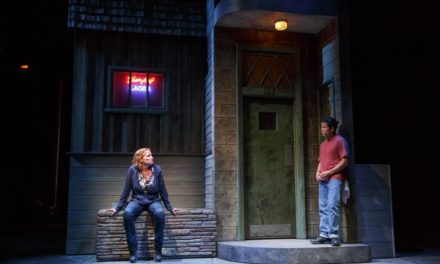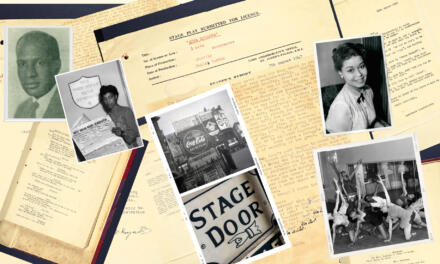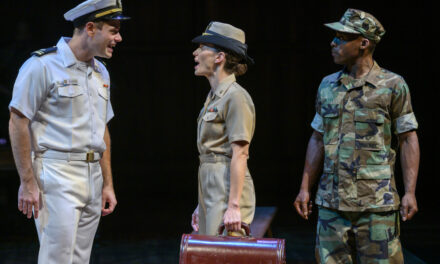On a cold November, New York Friday night, when temperatures approached freezing, the shivering audience waiting to experience Albert Camus’ The Fall at the Soho Playhouse checked in at the box office on the upper floor, then returned to the cold, breath-puffing visibly like a cigarette smoker’s exhale to descend into the depths of the Playhouse’s basement venue, the Huron Club. The space was convincingly transformed into the Mexico City, a bar in Amsterdam’s red-light district circa 1956. The walls were lined with vintage-looking, colorful travel posters, all slightly askew on the walls, suggesting benign neglect found in a running to seed bar.
There were no traditional rows of audience seating, but rather cafe tables and chairs, booths, bar stools at the bar. Single audience members seated alone at various tables were told unceremoniously by an imperious woman with a European accent that they would be required to share. A couple of the bar stools were reserved as they had been incorporated into the show’s action. Even the Huron Club’s resident bartender eventually became part of the show perusing a period issue of Playboy when not serving the show’s main character, Jean-Baptiste Clamence, played by Ronald Guttman.
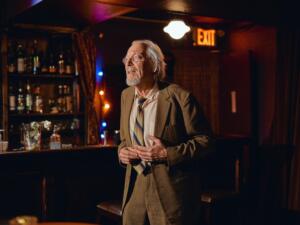
Ronald Guttman as Jean-Baptiste Clamence. Photo Credit: Zack DeZon.
The show is an extended monologue containing Clamence’s rumination on his once exemplary – or so he thought – life. Clamence has spent his life as a successful defense lawyer specializing in cases protecting women and children from which springs his self-congratulatory view that he is a good man and an upstanding citizen. Eventually, an event occurs in which he does not act, although there is no obligation, other than for humanity’s sake, that becomes the springboard for his inner awakening to begin. Is he a good person? He could have chosen to act but didn’t. Subsequent incidents, coax him off the path of self-righteousness and onto the path of awareness of the inequities of society and how little he has done to ameliorate the imbalance he now perceives.
Sound familiar? Clamence’s journey could be a summary of recent American history continuing to play out, beginning with the Black Lives Matter protests that have forced new light to be shed on what was hiding in plain sight. Many of us failed to act, chose not to act, or even failed to acknowledge what was grossly evident to anyone with the eyes to see it. Clamence says at one point during his monologue, “You can never really provide anybody’s innocence but you can be sure we’re all guilty. Everyman bears witness to the crimes of all the others.”
The Fall is an often overlooked novel by Albert Camus. It is his final novel, and Ronald Guttman has been obsessed with since he read it at 17. He said in an interview for the show, “What Camus says in The Fall is fundamental and has been a kind of moral compass to me ever since I first read the novel at 17. I’m looking forward to enacting this great text for intimate New York audiences at a moment in time when many of us are questioning certain values on which we’ve built our lives.”
The most memorable line comes early in the show when Clamence exhorts the audience to “Accuse yourself first.” While seemingly harsh on the surface, it is a deeply philosophical and metaphysical perspective that can lead to enlightenment and wisdom – a precious commodity in short supply in this age of information. Twenty-four performances of Albert Camus’ The Fall were held at the Huron Club at Soho Playhouse in October and November.
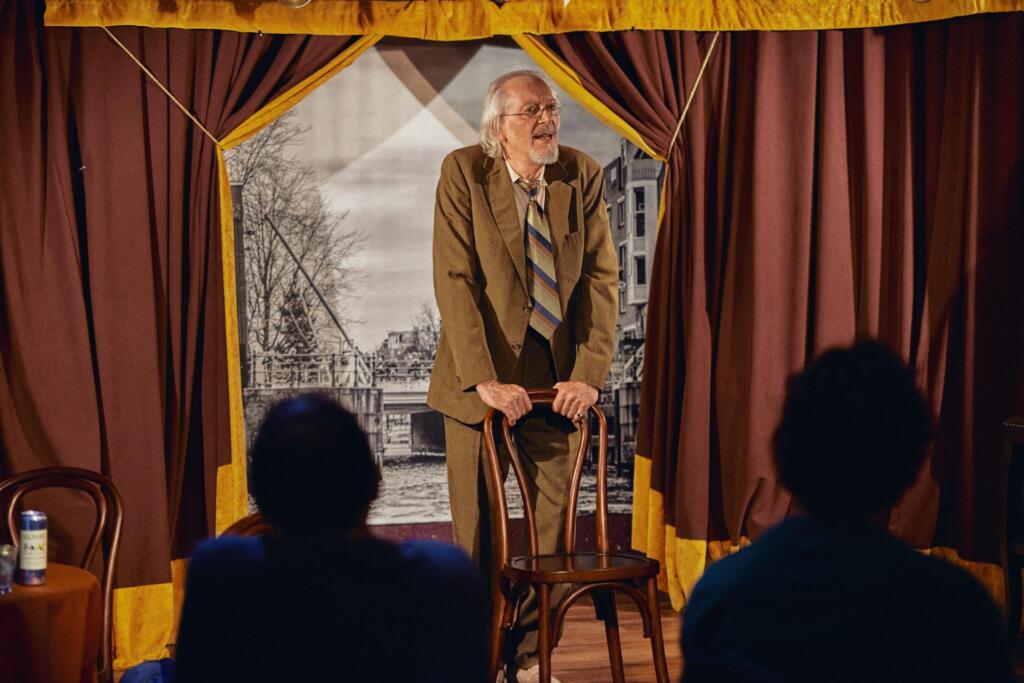
Photo credit: Zack DeZon.
Ronald Guttman is a theatre, film, and television actor, originally from Brussels, and active in both America and Europe. His theatre credits include the recent world premiere of Patriots, a new play by Peter Morgan (The Crown) directed by Rupert Goold with Tom Hollander and Will Keen at the Almeida Theatre, moving to the West End next spring.
Adaption of Albert Camus’ The Fall is by Alexis Lloyd, a film director, writer, and producer. He was CEO of Pathé UK in London, where he oversaw the production and distribution of over 90 feature films. Direction by Didier Flamand, a French actor, author, and theatre director. After his theatrical studies at the Vincennes’s Experimental Center, he taught at Ecole Polytechnique in Paris and University Paris VII. He then founded a theatre company directing his own original material.
This post was written by the author in their personal capacity.The opinions expressed in this article are the author’s own and do not reflect the view of The Theatre Times, their staff or collaborators.
This post was written by Clare Cioffero.
The views expressed here belong to the author and do not necessarily reflect our views and opinions.

